From Newspaper vendor to Foreign Service Officer
1. Welcome Mr. Shikongo to Namambe, I am very pleased to have you today as my special Guest as Namibia celebrates 26th Anniversary of our independence.
It is a great pleasure to be interviewed and welcomed by a former classmate.
2. What is your favourite food?
Omaere and Oruhere are my favourite, and of course Okapana.
3. Great! Please tell us more about yourself?
First of all, allow me to extend my deepest condolences following the untimely death of your dearest father’s name-sake Gosbertus Namwandi. May his soul rest in eternal peace!
I am Mr. Titus Koto Shikongo aka Kaizer, I was born in March at Anamulenge Roman Catholic Church Hospital in Omusati Region. I was told that a few days later we were discharged from the hospital and returned to our home village, Oshipaya in Omusati Region. Oshipaya is 10 km East of Outapi town. I grew up there looking after cattle and swim in Oshanas during rain seasons. These Oshanas are situated within Oluzizi area.
According to my peers I was apparently a tall boy who was good at pounding mahangu and riding donkeys. At that time I did not develop an interest in reading but I was always keen to attend Sunday service at Anamulenge Roman Catholic church.
Since the church was far from Oshipaya I often did hike the Ford Pick-up of Tate Johannes Andjamba, a local businessman who used to go to the same church from our village.
Due to my regular church attendance and commitment to my religion, I became an altar boy and developed a keen interest in becoming a Catholic priest. I used to attend seminars/workshops which were mainly meant for young Catholics who would like to become brothers and priests.
In brief I spent few years at Oshipaya and then relocated to Oikango Village (still in Omusati Region) were I was raised up later moved to Oshihenye village to stay with my aunt. Oshihenye village is in close proximity to Outapi. So I have had three guardians in total.
4. Where did you go to school?
I started my primary school at Olupaka Primary School until Standard 4 (those days), then I moved to Okavu Primary School (now John Alphons Pandeni Combined School) for my Standard 5. I passed Std 5 with flying colours which surprised many of my school mates. During our days passing Standard 5 was a milestone because it enables you to proceed to Standard 6 which in our region offered only at a boarding secondary school.
In this regard all village boys and girls do envy you when you are at a boarding secondary school. However, moving to a boarding school that time had its own challenges because most of the boarding schools were close so South African Military Bases. Constructing military bases near schools was common in northern Namibia, both to shield the South African army from attacks by SWAPO PLAN Fighters and to also to intimidate the student movement (NANSO).
This was tough for me because when I was schooling at Olupaka Primary School I only used to meet SWAPO PLAN Combatants either on my way to school or at the school itself.
Anyway I started with my Std 6 at Ombalantu Secondary School (now David Sheehama Secondary School where I continued with my education till Std 8. (I still recall our heydays at that school, in our dialect they used to call it koseko/aaseko. I should say Sackey Aipinge, Petrina Mwetulundila and Anna Anghuwo should read this because they know what I am talking about.
After I completed my education at Ombalantu Secondary School I went to Mweshipandeka Secondary School. Unfortunately in 1988 there was a massive students boycott in support of Namibia National Students Organisations’ call for the removal of South Africa Army Bases next to schools. That academic year went to waste as many students could not attend classes. Due to those events I was only able to continue with my studies the following year at Mweshipandeka Secondary School in Ongwediva. The rest of the year I was just in Windhoek which helped to improve my English and Afrikaans in and around Katutura.
When I was done with Mweshipandeka I moved to Windhoek again and ended up selling newspapers in the streets especially the Namibian newspaper. It was a tough job, I have to wake up at five in the morning to collect enough newspapers to sell for a profit. Two journalists, Saara Johannes and the late Tyapa Namutewa made sure I got enough copies to sell as they knew me from NANSO rallies. Zula to survive!
I was lucky to secure a job in the government as a Foreign Service Officer after spending a year selling newspapers. I worked in this field for more than ten years. From a very young age, it was my desire to study and travel, for reasons that I was not certain about. Perhaps, I wanted to be exposed to cross-cultural experiences and travel extensively. Fortunately at one point in time my employer posted me to London, a cosmopolitan City that I have never dreamed about working in it.
During my stint in London I enrolled with the University of Westminister to do my first degree in Diplomatic studies. Surely my love for education started while working in the Land of the Queen. In addition to this, I also completed Management Development Programme (MDP) with the University of Stellenbosch. After completing the first Management Development Programme I continued with the senior programme, this time with the university of Harvard-Kennedy School of Government.
In addition I also took a course in Anti-Money Laundering Control with the University of Johannesburg.
All these courses laid the foundation for the Masters of Arts in International Relations and Development that I received this year from the University of Nottingham.
5. What did you learn from your primary school that is still useful in your life?
I learned a lot fromHistory and Geography because these subjects helped me to build my career. Without the knowledge or background of the two subjects, life could have been tough for me when I travelled in some of the world cities. In this regard I would like to sincerely thank my retired former teacher and principal Miitili Isdor Kanyangela for his leadership skills and guidance.
6. What is your highest qualification so far?
Master of Arts in international relations from the University of Nottingham
7. How would you describe the universities that you have been studying with and what was the topic of your thesis?
Both Westminster and Nottingham universities are reputable institutions. Students at these institutions of higher learning do learn collaboratively in order to benefit from one another’s expertise and experience. Furthermore the diverse professional experiences and skills that international students share with one another provide students with deep and mature insight. Having such mixture of people from different background it is like a having a mini UN in action.
To come back to your second question, the topic of my research was: Understanding Bilateral Relations between Namibia and China: Mapping the journey 1990-2015. If there is any person who is interested in reading it he or she should please feel free to request it via my e-mail: junior_2002na@yahoo.com
8. When you were doing research for your studies it is likely that you did interview some people face-face, do you recall some of the people that you have spoken to.
Well, I was honoured to interview His Excellency, Dr. Sam Nujoma, for three hours at his farm in Otavi. He was an excellent walking library for my research with regard to Namibia-Sino relationship. The Founding President has excellent memory and he carefully studies every subject that comes before him.
Furthermore I also did interview one of Namibia’s seasoned retired diplomats and long served Minister of Foreign Affairs, Hon. Dr. Theo Ben-Gurirab. Suffice to say I am deeply indebted to our Guru of diplomacy for assisting me to develop an interest in research, especially the topic that I have chosen which I hope would be useful in understanding the relationship qualities in diplomacy. Another interviewee who added value to my research was Mr. Onesmus Upindi, Commissioner of the National Youth Service. Some of you may recall that Commissioner Upindi was tasked to open the Embassy of Namibia in the People’s Republic of China.
8. In your view what is International Relations all about?
It is a technical question! International Relations is a study of the complex relations between and among states, societies, individuals, identities and cultures, theoretically and empirically. It deals with issues relating to economics, law, politics and national security. It also helps people to understand the reasons for the persistence of global poverty and inequality and how current development paradigms contribute to poverty eradication not reduction.
It is a burning issue of the century if not of our life time: how power and resources are allocated on the international stage; how; where; when and to which geographical region; who decide and why it was decided in the manner it is now.
People often fail to see the need for training in the craft of international relations education. Some think that international relations is about politics and some think is simply a matter of good sense and general knowledge. Others believe that so long as one represents the wishes of the people in good faith, then one is doing the right thing. These perceptions are mistaken, in fact international relations is critical to good governance.
My two years of part time study sponsored by my employer, confirmed my respect for the value of diplomacy. I picked up much from my fellow students, who came from all over the world. I learned how economic principles were relevant to a wide range of policy areas even those which at first sight appeared far removed from economics. The economics is not only quantitative methods as we can imagine, but can be economic management and poverty alleviation within governments.
9. Please share with our readers about the abstract of your thesis?
Briefly, I did unpack and analyse Namibia-China Bilateral relations in the context of international relations education. The cordial health relations that developed at a steady pace from the onset of establishment diplomatic ties just one day after the independence of Namibia. The relations stretched back to historical links, camaraderie and people to people from exile to multi-trade and investment and bilateral economic partnership we see today.
In this study I tried to discuss in details political environment of both countries from various policies perspectives such as trade, exchange and investment of Namibia and China have also been critically analysed through the research. However, the scenario, the harmonious relationship between the two countries seem to be adversely affected due to labour law practice.
Challenges are there, but they are to be resolved through appropriate channels. It came to the researcher’s attention that the relations between the two have been overlooked in most of the studies. Hence, this study is important in order to gain an understanding regarding the impact of the relations on the cultural and economic development. The study basically reflects the ever growing presence of China on the African continent including Namibia.
The good thing about China is that they do not have any intention of financing coups or changing of African regimes or deploying military forces in support of its foreign policy. Moreover, the relations with Africa would be based on a win-win cooperation since China treats equally all African countries whether big or small. Some scholars around the world filled with no factual writing that the presence of China in Africa is purely a marriage of convenience. Therefore, I provided relevant theories and model that systematically trace the process of social evolution. In this context, I traced the diplomatic patterns mapping the journey from 1990-2015.
To understand China and what China would be like in five years’ time from now on, you have to know their culture and political environment. China is growing economically, militarily, and politically and did outperform the United and its western allies. Some practitioners in international relations and political commentators especially in the west want to see China becoming a democracy in the western tradition which is unlikely to happen.
In a study done by Professor Andre du Pisani of the University of Namibia, it is argued that the relations between Namibia and China is a significantly benefitting Namibia in terms of soft loans with minimal conditions attached to them. In addition it provides Namibia with a large market for its raw materials and renders political support to Namibia and Africa in multinational fora. On multilateral diplomacy, Namibia happily enjoys its membership for the Forum on China-Africa Co-operation (FOCAC) since its inception in 2000, in Beijing.
10. You have been in Asia for few years now, what have you learned from those people that can be of use to Namibia?
As a Foreign Service officer I was assigned by my employer to serve the South-East Asia region. The region is a family to ten countries among the big players are Singapore, Malaysia, Indonesia and Thailand, just to mention a few. The ten countries are active member of the Association of South East Asian Nations (ASEAN). South-East Asia is an emerging major power on the international stage and its economic rise has been extraordinary. Both China and the USA are drawing huge interest in the region. Singapore is one of the beautiful Republics that looks like a city in the garden, very small, highly developed and it is surrounded by the water.
One thing I learned from the loving people of this region is their culture. Culture is powerful force that can affect the effectiveness of nations and their daily life. Kids are brought up to respect their own culture and traditional norms from what they eat at home and how they wear in public. Most Asian countries are multi-ethnic, multi-cultural and multi-religious society. Back home in Namibia our kids do not accept their culture and traditions, they are more into western daily practices. For instance when children in Namibia are accompanying their parents/guardians to villages some refuse to eat mahangu, oruhere and mutete.
11. If you become the Secretary General of the UN what are you going to change during your first 100 days in Office?
Wow! That will be the day when I will be the ninth Secretary–General succeeding Ban-Ki moon, (LOL). But seriously if I become the Secretary General of the world family of nations I would encourage world leaders to maintain international peace, security and gender promotion.
In addition I will make sure that the world strives to meet poverty reduction targets focusing on inequalities. Making particular efforts in countries with special needs and in those which have not achieved sufficient progress.
One of my priorities would be the promotion of Climate financing by introducing and activating the Green Climate Fund and set public and private funds on a trajectory to prosperity by 2025.
I will also work closely with member states of the Ten-Committee (C-10) advocating the reform of the UN Security Council. Namibia is a member of the Ten-Committee. As a Secretary General I will make sure that the UN becomes more accessible, flexible and accountable. Another issue that I will pay serious attention to is the provision of security to UN staff who work in war torn countries starting with Syria, Iraq, Libya, Central African Republic, Sudan and Mali.
12. If you are given one billion to change something in Namibia what would it be?
Should I wake up tomorrow with one billion in my bank account, I am going to engage engineers and experts in agriculture from our development partners to turn half of Namib desert into agricultural and agro-processing hub. I am sure it is possible to turn the Namib desert into a green scheme. When we talk and admire Dubai’s agriculture products or Kuwait city dates from their deserts, the same thing can be done here. All these two countries were desert like countries with wild camels a few years ago.
I will donate half of the money to vulnerable and orphan children of the Kunene Region of our beautiful country to enable them to complete their basic education. This will supplement the government effort of providing free basic education.
13. How many countries have you travelled to so far, list them?
I travelled to most countries of the world as part of my duties. Let me give divide this information in 5 categories.
Africa: I travelled all 14 SADC countries and also to the following non-SADC members namely; Nigeria, Ghana, Kenya, Uganda, Cameroon, Liberia, Lybia (when Lybia was real) and the Comoros islands.
Europe: UK where I worked and lived for few years on assignment, Ireland, Italy, Belgium, Germany, Czech Republic, France and Malta
.
Asia and Pacific: Malaysia, Indonesia, Thailand, The Philippines, Singapore, Brunei, East-Timor, Vietnam, Cambodia, Pulau, Maldives, New Zealand, India, Nepal and of course couple of time to China.
North and South America: USA, Argentine, Chile and Brazil.
I do not know how I missed Cuba during my trips.
Middle-East and North Africa: I was also fortunate to touch my feet in the oil region:
Dubai in United Arab Emirate, Kuwait, Qatar and Libya-when Libya was Libya.
14. What message would you like to give to the Namibian Youth who have nothing to do at all?
Tough question indeed! The Youth are the asset of any society and organization. Growing up today is harder compared to many years ago when I was young. It is tough to live in urban areas, I remember this when I was a newspaper seller on the streets of Windhoek in the 1990s. In my view it is much easier to live in rural areas because crime in rural areas it not the same as in urban areas. In rural areas we were just cattle herders no criminal gangs like what they have in cities today.
There were also few shebeens and it was rare to hear that someone was smoking dagga or cocaine. In order to address most of our social ills we need to have enough teachers and medical doctors in our community. We should not have witchdoctors or false prophets as is the case these days.
Many youth have given up their education or desired careers due to circumstances beyond their control. I know that NUST or UNAM is not for everybody’s brain, therefore some people should rather go for vocation training in order to gain practical skills that will help our economy to grow fast. The youth should not engage themselves in unlawful activities such as house-breaking and drug abuse as they will end up in jails.
I admire Kaleb Soini, dedicated young man who has never been aboard an aeroplane but came up with surprising innovative idea of manufacturing jet fighter. His example should be emulated.
Finally I would like to share the following quote with the youth by Kofi Annan, former Secretary General of the UN: “Young people should be at the front of global change and innovation. Empowered, they can be key agents for development in peace. If, however, they are left on society’s margins, all of us will be impoverished”.
15. What message do you have to the business community and entrepreneurs from your home town?
Once we become successful entrepreneurs or so-called intellectuals we tend to forget where they we came from, we forget our own community, we forget our own small villages. Sometimes we even approach the Ministry of Home Affairs to change our surnames for status purposes. Come on!! A wise-man never do that. Businessmen and women of my home town let us give back to our community, let us share what we have been blessed with.
The community lacks projects like poultry farm and backyard gardens. At this stage I am only aware of a single poultry project in my areas owned by a young man at Anamulenge. We need more of this in order to cater for high chicken products demand during festive seasons.
My opinion is that business community shouldn’t just wait for a gala dinner to demonstrate their support but can do it throughout the year in different ways. I appreciate those who use to plough back to their communities during xmas but I want them to go a step further by using that opportunity to share developmental ideas with villagers and mentor them in order to help develop villages. Charity begins at home and your home is your community.
16. Do you have anything to say to your former teachers?
Oh yes! I am indebted to those who helped me to express myself in English. Special thanks go to my former teachers: Mevrou Maria Aipanda from Olupaka Primary school, late John Aitembu from Okavu Primary school, Mevrou Anna yaKole the teacher who taught me how to do calctulations. My memories also goes to my former History Teacher Meestele Absai Shaningwa, the man who convinced me that only History can make a person wise and enables him or her to understand the world better.
I am also proud of Mr. Protasius Andowa for his excellent English teaching skills at Ombalantu Secondary School. The same goes to Miitili Fillemon Shikwambi, Mevrou Hilma Naundjomba Anghuwo and Meestele Amutse Mwanyangapo.
I will be negligent if I do not mention the likes of Mevrou Lucia Shipena and Mevrou Meme Nkandi, Gabes Nghipukuula and Hans Nghihulifwa at Mweshipandeka Senior Secondary School.
Believe me or not! I also had a political teacher out of the classroom, the late Anton Lubowski, continue resting in peace comrade.
I strongly advise that we should keep our former and current teachers close to our heart because they are the people who made us who we are today. Let us also keep in touch with our old friends irrespective of their status in the society.
17. What is your favourite Sport?
Basketball. I enjoy playing street Basketball. I am a big fan of Basketball sometimes I wish I could play it from my work desk.
18. Finally is there something that you would like to share with the people of Namibia at this juncture?
I would like to thank you all for your time to read this interview and I will leave you with the following famous quote as it affects our daily life:
“We think sometimes that poverty is only being hungry, naked and homeless. The poverty of being unwanted, unloved and uncared for is the greatest poverty”.
Mother Theresa
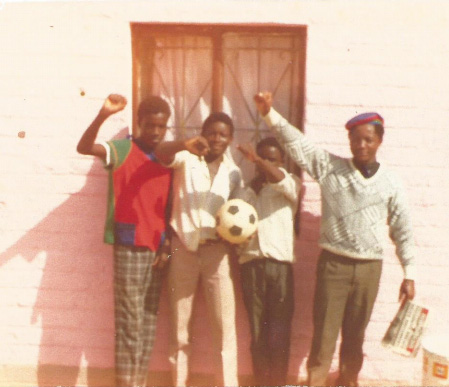
Mr. Shikongo with his comrades at popular Pink House in Katutura, following the announcement of the death of
Cde.. Mauritius Avula, a SWAPO businessman who was brutally killed by Koevoet between Ondangwa and Oshakati
on 4 May 1988.
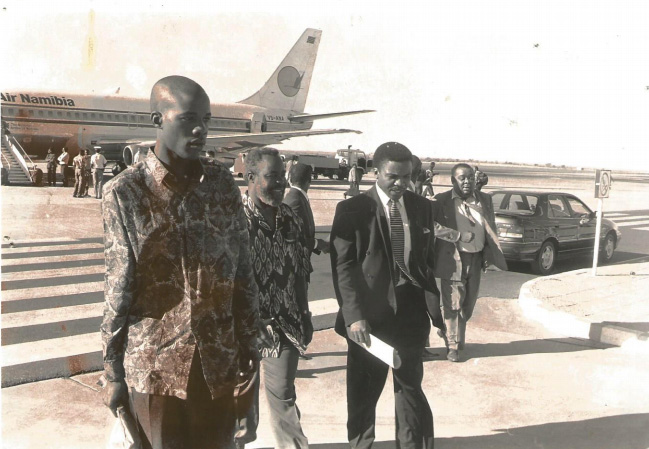
Mr. Shikongo doing his duties by assisting Ambassador Tuliameni Kalomoh, then Deputy Minister of Foreign Affairs,
after receiving the delegation from Zimbabwe at Walvis Bay Airport during Langkawi Dialogue Summit, 1998.
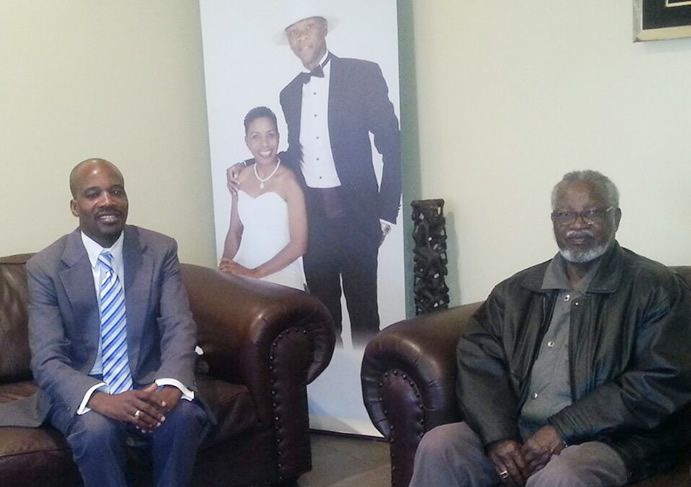
Mr. Shikongo interviewing H.E. Dr. Nujoma for his research. He found him to be a walking library indeed.
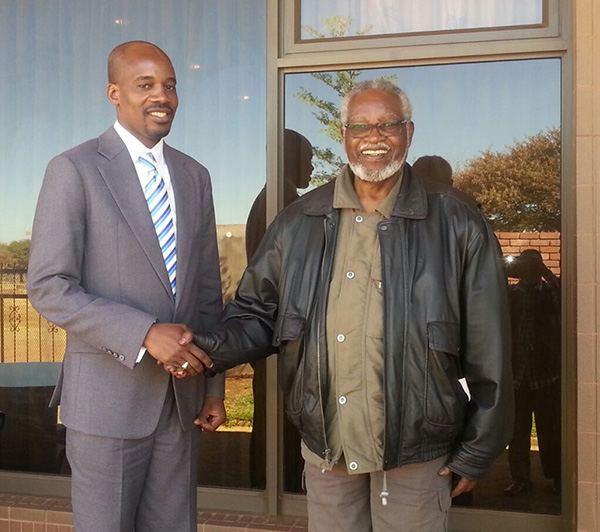
The scholar to be, Mr. Shikongo being seen-off by the Founding President H.E Dr. Sam Nujoma after his face-to-face interview with him. Before he left Etunda Trust Farm the Founding President did show him the piece of land that he donated to build a Primary School and Clinic for the farm workers's children in Otavi District and Surrounding areas.
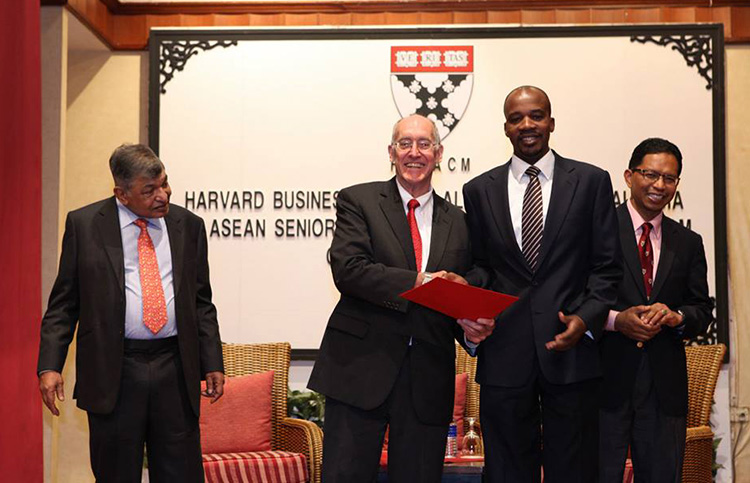
Mr. Shikongo receiving his Senior Management Development Programme (SMDP)
from Professor Richard Vietor from Harvard Business School, 2013
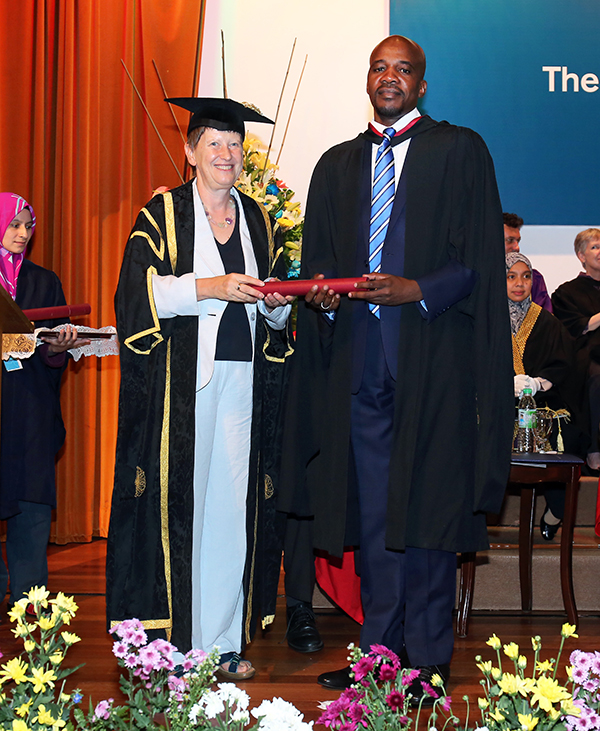
Mr. Shikongo receiving his certificate scroll by head of school of International Relations & Politics,
Professor Christine of Nottingham, 2015.
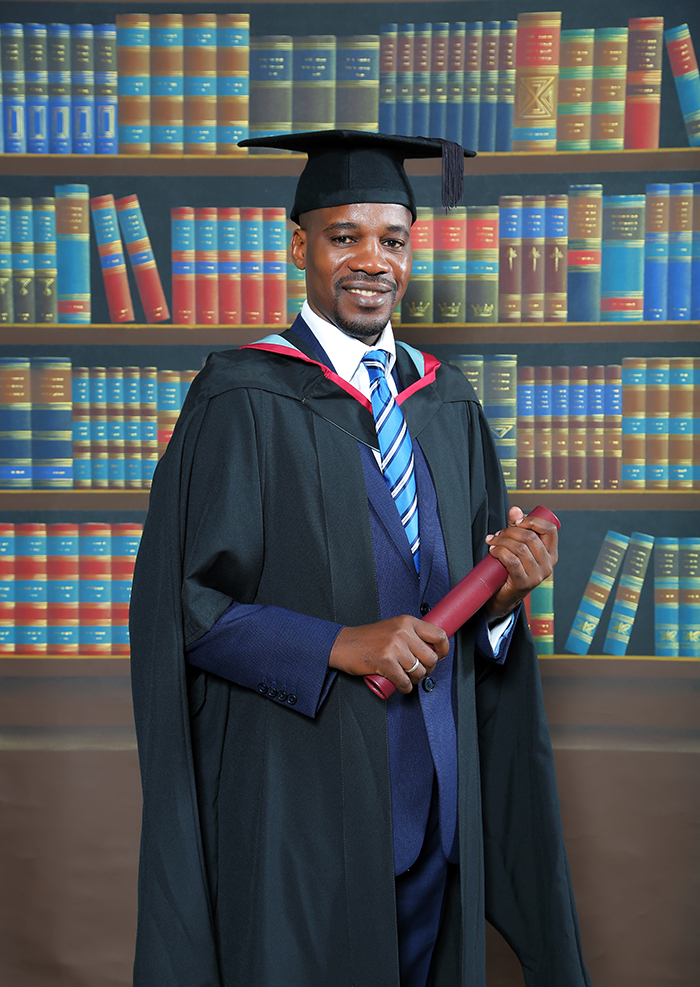
Mr. Shikongo, posing for the photo shortly after graduation.
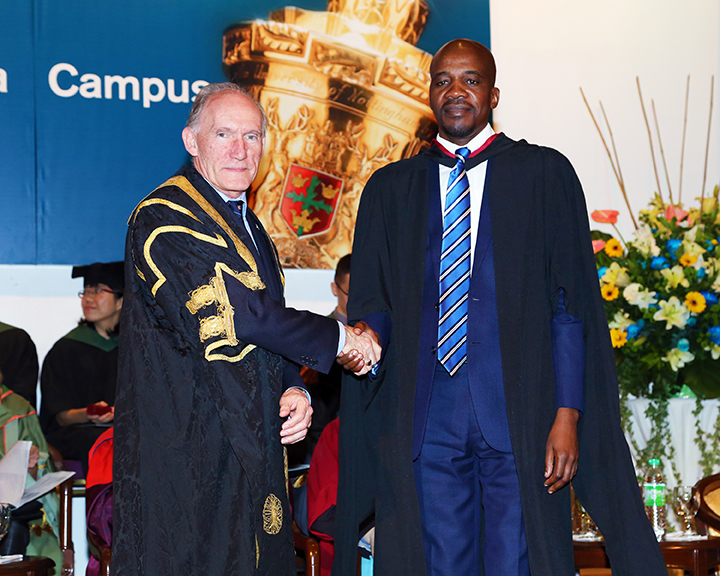
Mr. Shikongo being congratulated by Professor Sir Andrew Greenaway,
Vice-Chancellor of the University of Nottingham, UK.
|

